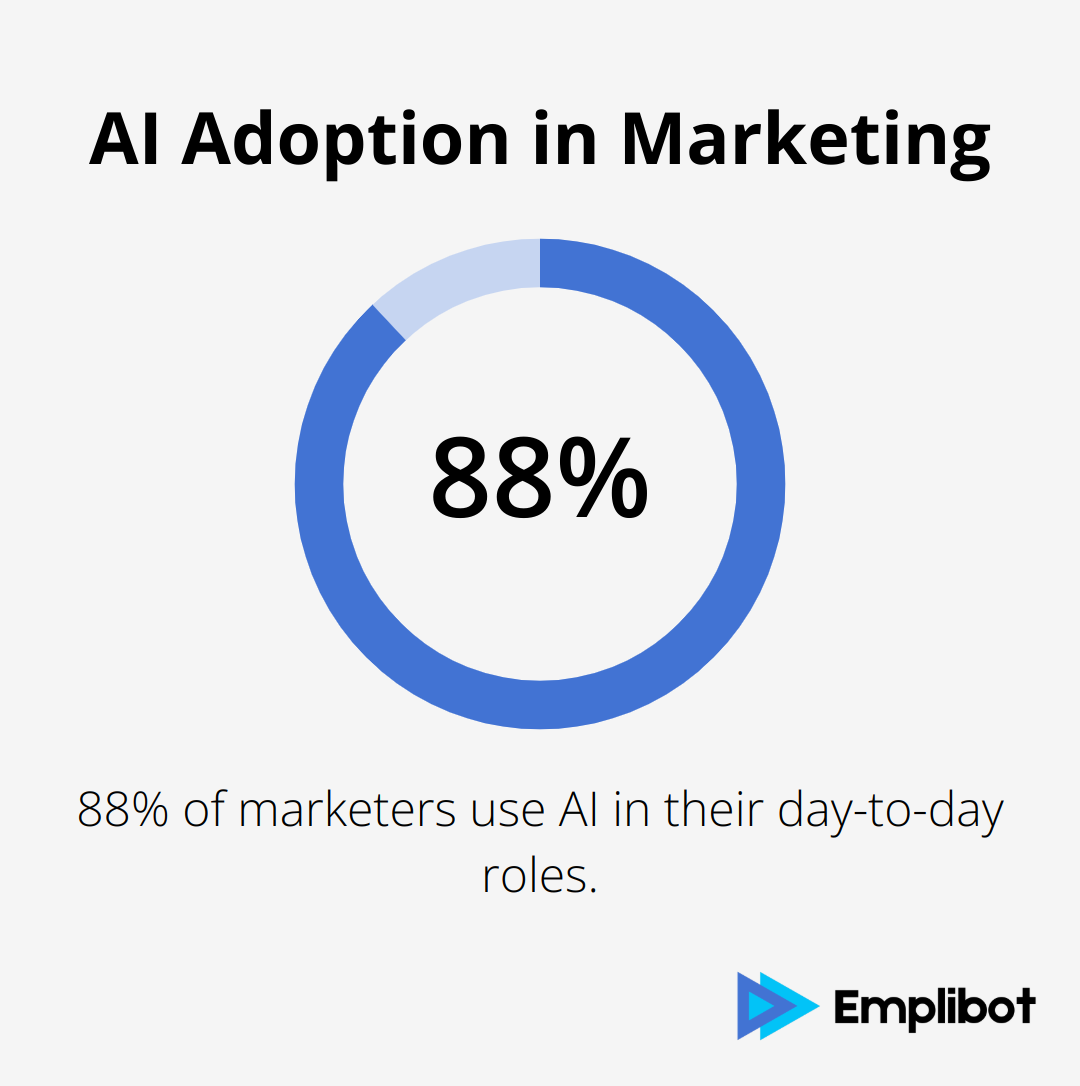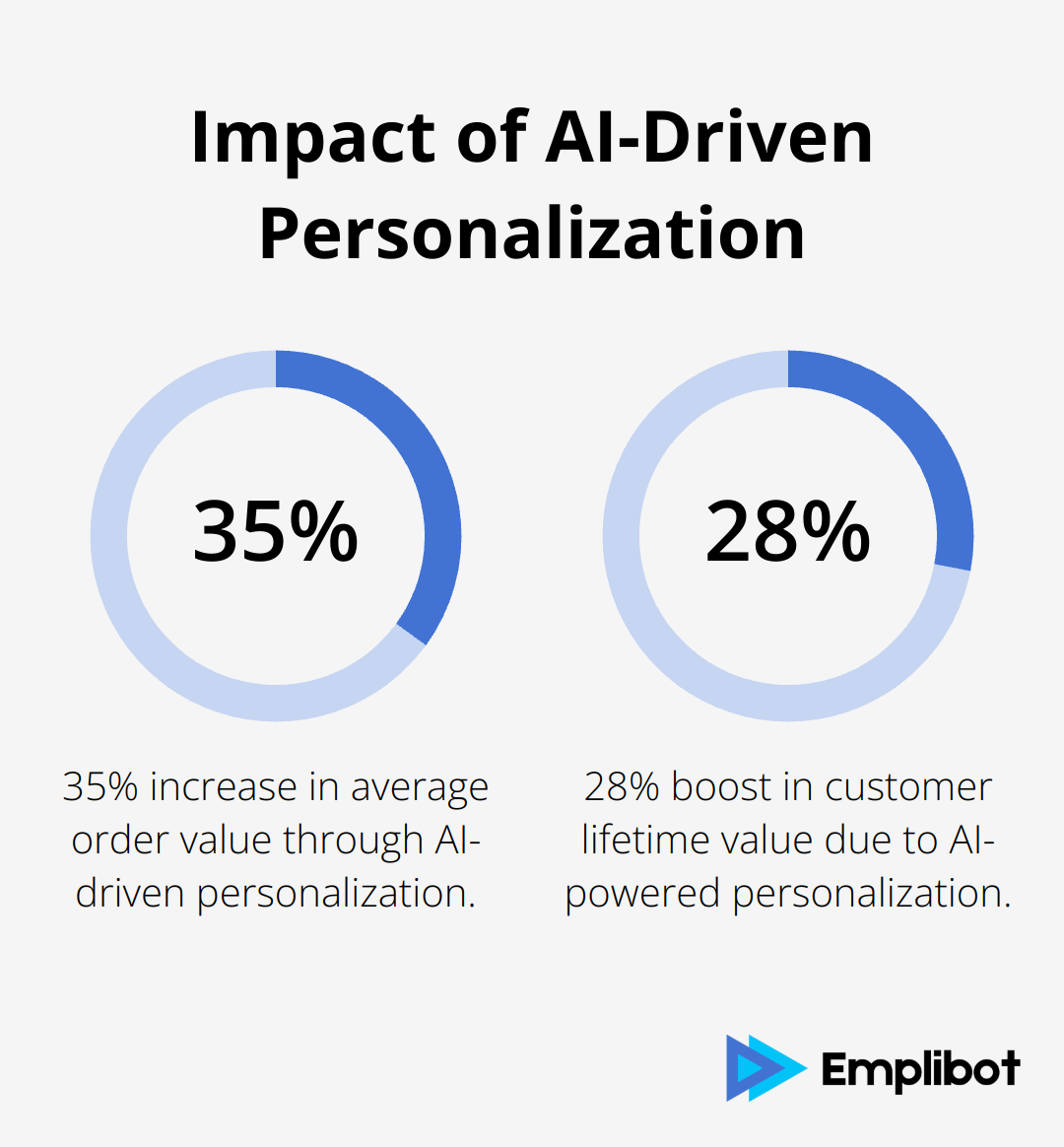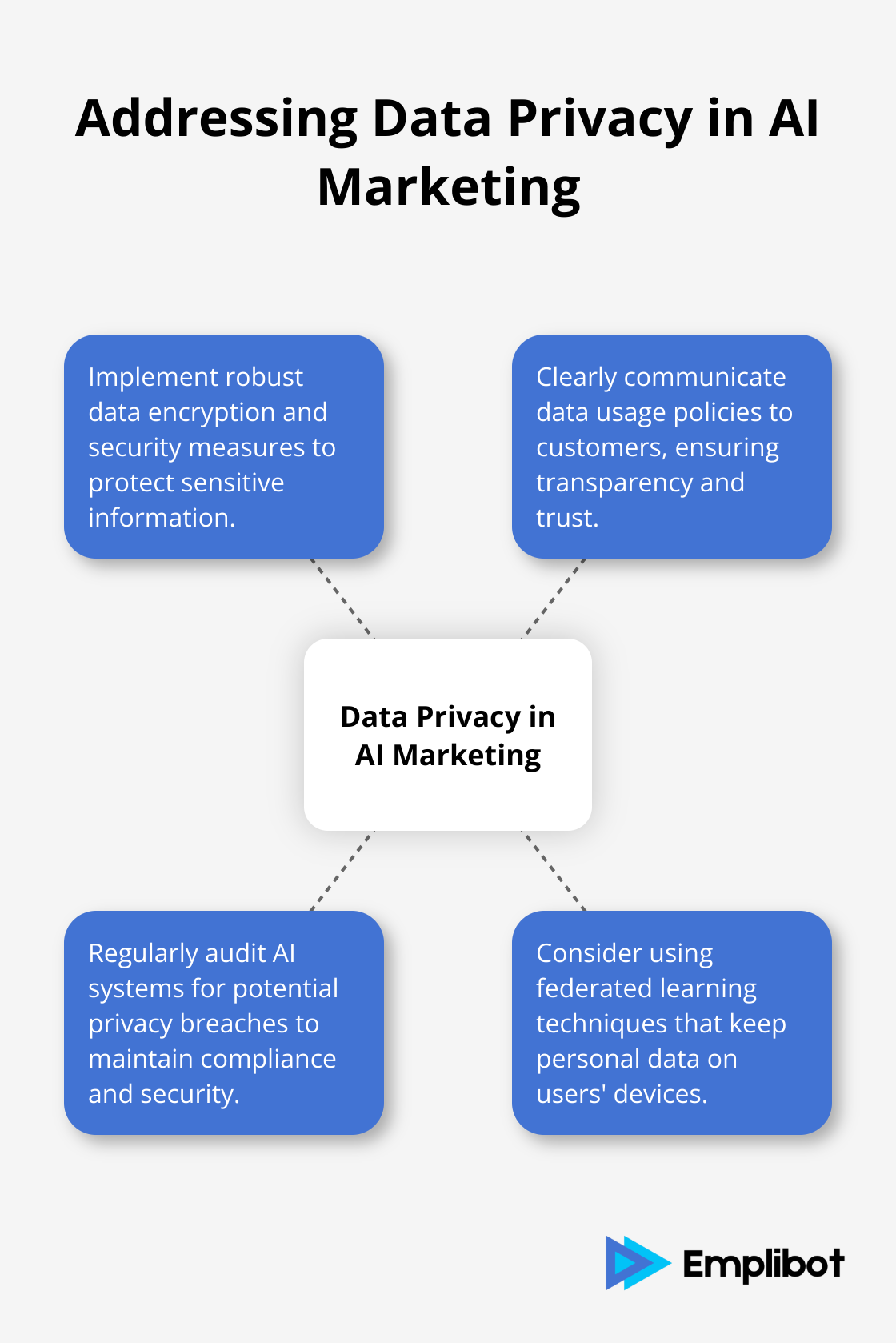At Emplibot, we’ve compiled the latest AI marketing statistics for 2025 to help you navigate the rapidly evolving digital landscape.
The data reveals a seismic shift in how businesses leverage artificial intelligence to boost their marketing efforts.
This blog post will explore the current state of AI adoption, its impact on marketing performance, and the challenges marketers face in implementing these cutting-edge technologies.
How Widespread is AI Adoption in Marketing?
Current Adoption Rates
The marketing landscape transforms rapidly, with AI adoption skyrocketing across industries. The 2024 State of Marketing AI Report from the Marketing AI Institute highlights an unprecedented acceleration in AI adoption among marketing professionals.
A remarkable 88% of marketers use AI in their day-to-day roles, indicating AI’s mainstream status in the marketing industry. This widespread adoption extends beyond tech-savvy sectors; traditional industries also embrace AI to maintain competitiveness.

Projected Growth
The future of AI in marketing appears even more promising. Experts project the global AI in marketing market to reach $47.32 billion by 2025, up from $12.05 billion in 2020. This represents a compound annual growth rate (CAGR) of 36.6%, demonstrating the explosive growth potential of AI in the marketing sector.
Top AI Applications in Marketing
AI revolutionizes various aspects of marketing. Here are some of the top applications:
- Content Creation and Optimization: 51% of marketers use AI tools to optimize content for campaigns, while 50% create content directly using artificial intelligence.
- Personalization: 73% of marketing professionals believe AI plays a key role in creating personalized customer experiences. This has resulted in a 35% increase in purchase frequency due to AI-driven personalization.
- Chatbots and Customer Service: Companies like Photobucket have improved response times by 14% using AI-powered chatbots, enhancing customer satisfaction and engagement.
- Predictive Analytics: AI-driven analytics have been shown to improve decision-making speed by 78%, while predictive analytics increase forecasting accuracy by 47%, allowing marketers to make more effective data-driven decisions.
- Automated Task Management: 43% of marketing professionals automate repetitive tasks using AI software, freeing up time for more strategic activities.
The Impact on Marketing Strategies
The rapid adoption of AI in marketing necessitates a shift in strategies. Marketers must adapt to this new landscape or risk falling behind. AI enables more precise targeting, personalized messaging, and data-driven decision-making (at a scale previously unimaginable).
Companies that successfully integrate AI into their marketing efforts often see significant improvements in efficiency and effectiveness. For instance, AI-powered content creation tools can produce high-quality, SEO-optimized content in a fraction of the time it takes human writers.
Challenges in AI Adoption
Despite the clear benefits, AI adoption in marketing faces challenges. Data privacy concerns, integration with existing technologies, and the need for specialized skills present hurdles for many organizations. However, these challenges also create opportunities for innovative solutions and new business models in the AI marketing space.
As we move forward, the role of AI in marketing will only grow more significant. The next section will explore how this widespread adoption translates into tangible impacts on marketing performance, including improvements in lead generation, customer engagement, and ROI.
How AI Boosts Marketing Performance
Supercharging Lead Generation and Conversions
AI has revolutionized lead generation and conversion rates. A Salesforce study reports businesses using AI for lead scoring experienced a 30% increase in leads and a 25% rise in deal closures. This improvement stems from AI’s capacity to analyze extensive data and identify high-quality leads with precision.
A B2B software company implemented an AI-driven lead scoring system and saw a 50% increase in qualified leads within the first quarter. The system analyzed factors like website behavior, engagement with marketing materials, and social media activity to prioritize leads most likely to convert.
Elevating Customer Engagement and Retention
AI-powered personalization has transformed customer engagement strategies. This research focuses on the current state of digital marketing with respect to integrating Artificial Intelligence (AI) to strengthen consumer experience with personalized content.
A major e-commerce retailer implemented an AI-driven product recommendation engine. They experienced a 35% increase in average order value and a 28% boost in customer lifetime value within six months of implementation.
Maximizing ROI Through Cost Savings
The financial impact of AI in marketing is substantial. McKinsey reports that AI can potentially unlock $1.4 trillion to $2.6 trillion in value for marketing and sales. This value comes from both increased revenue and significant cost savings.
A mid-sized marketing agency adopted AI-powered content creation tools and reduced their content production costs by 40% while increasing output by 300%. This efficiency gain allowed them to take on more clients without expanding their team, directly impacting their bottom line.

Optimizing Marketing Spend
AI-driven predictive analytics enable businesses to optimize their marketing spend effectively. This study explores the effects of artificial intelligence (AI) and predictive analytics on digital marketing strategy and return on investment (ROI).
The impact of AI on marketing performance is clear and measurable. As these technologies continue to evolve, businesses that fail to adopt AI risk falling behind their more tech-savvy competitors. However, with great power comes great responsibility. The next chapter will explore the challenges and concerns that arise with the widespread adoption of AI in marketing.
Navigating the AI Marketing Minefield
The rapid adoption of AI in marketing brings unprecedented opportunities, but it also presents significant challenges. As marketers rush to implement AI solutions, they face hurdles that can impede progress and potentially harm their businesses if not addressed properly.
The Data Privacy Conundrum
Data privacy stands as the foremost concern in AI marketing. With 40% of marketers citing it as a major barrier to adopting AI tools, organizations must tread carefully. The implementation of stringent data protection regulations (like GDPR and CCPA) has raised the stakes for companies handling consumer data.
A recent survey revealed that 70% of consumers have little to no trust in companies to make responsible decisions about how they use AI in their products. This heightened awareness puts pressure on marketers to ensure transparency and obtain explicit consent for data usage in AI-driven campaigns.

To address these concerns, marketers should:
- Implement robust data encryption and security measures
- Clearly communicate data usage policies to customers
- Regularly audit AI systems for potential privacy breaches
- Consider using federated learning techniques that keep personal data on users’ devices
The Integration Puzzle
Integrating AI with existing marketing technologies poses another significant challenge. Many organizations struggle to seamlessly incorporate AI tools into their current tech stack, which leads to inefficiencies and data silos.
A study by Gartner found that 63% of organizations face difficulties in integrating AI with their existing systems. This integration challenge can result in fragmented customer data, inconsistent messaging, and suboptimal campaign performance.
To overcome this hurdle:
- Conduct a thorough audit of your current martech stack
- Prioritize AI solutions with open APIs and pre-built integrations
- Invest in a robust Customer Data Platform (CDP) to unify data across systems
- Start with pilot projects in specific areas for gradual implementation
Bridging the AI Skills Gap
The shortage of AI-skilled professionals in marketing teams is a growing concern. According to a LinkedIn report, AI and machine learning skills are among the fastest-growing in demand, with a 190% increase since 2015.
However, 70% of marketers say their employer doesn’t provide generative AI training, which leaves a significant skills gap. This lack of expertise can lead to poor implementation, misinterpretation of AI-generated insights, and missed opportunities.
To address this skills gap:
- Invest in comprehensive AI training programs for your marketing team
- Partner with AI experts or consultancies for knowledge transfer
- Encourage a culture of continuous learning and experimentation with AI tools
- Consider hiring specialized AI talent to lead your marketing AI initiatives
Ethical Considerations in AI Marketing
As AI becomes more prevalent in marketing, ethical concerns arise. Marketers must ensure that their AI-driven campaigns do not perpetuate biases or manipulate consumers unfairly.
A study by the MIT Sloan Management Review found that 67% of consumers are concerned about the ethical implications of AI in marketing. This concern extends to issues such as algorithmic bias, lack of transparency, and potential job displacement.
To address these ethical concerns:
- Develop clear ethical guidelines for AI use in marketing
- Regularly audit AI algorithms for potential biases
- Maintain transparency about AI use in customer interactions
- Balance AI automation with human oversight and decision-making
Final Thoughts
The AI marketing statistics for 2025 reveal a transformative shift in the industry. With 88% of marketers already using AI daily and a projected market value of $47.32 billion by 2025, AI has become an essential tool for modern marketing strategies. These figures highlight the significant impact of AI on lead generation, personalization, and decision-making processes across the marketing spectrum.
Despite its benefits, AI adoption faces challenges such as data privacy concerns, integration difficulties, and skills gaps. Marketers must address these issues to fully harness AI’s potential and stay competitive in an increasingly AI-driven landscape. The future of marketing will demand continuous adaptation and strategic implementation of AI technologies.
For businesses seeking to leverage AI in their marketing efforts, Emplibot provides a comprehensive solution. This platform automates content marketing processes, helping businesses increase traffic, leads, and sales while saving time and resources. As AI continues to reshape marketing in 2025 and beyond, tools like Emplibot will play a vital role in maximizing marketing potential and driving success.
![AI Marketing Statistics [2025 Edition]](https://wp.emplibot.com/wp-content/uploads/emplibot/ai-marketing-statistics-2025-1754291304.jpeg)
